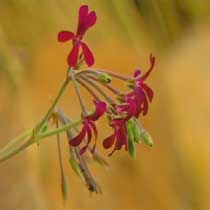 Pelargonium sidoides (aka EPs 7630 and Umckaloabo) is an herbal extract derived from the gerenium. It’s used to treat acute respiratory tract infections (ARIs) where antibiotics are unnecessary.
Pelargonium sidoides (aka EPs 7630 and Umckaloabo) is an herbal extract derived from the gerenium. It’s used to treat acute respiratory tract infections (ARIs) where antibiotics are unnecessary.
The Cochrane Library has reviewed the evidence, as has Prof. Ernst.
First, the details of the Cochrane review.
- The authors reviewed studies where P. sidoides preparations were used to clear the symptoms of ARIs.
- Acute bronchitis: In 3 studies of 746 adults and 3 other studies of 819 children.
- Acute bronchitis occurs when the large airways in the lungs become inflamed
- Sinusitis: An unpublished study in 103 patients.
- Sinusitis is an inflammation of the sinuses in and around the nasal passages that may or may not be due to infection
- Common cold: 1 study.
- In all studies the patients were randomly assigned to Pelargonium or other treatment, and they and the researchers did not know the treatment given — double blind.
And, the results.
- The reviewers found that Pelargonium sidoides “may be effective in relieving symptoms of acute bronchitis in adults and children.”
- It “may (also) be effective in alleviating symptoms of acute rhinosinusitis and the common cold in adults.”
- Side effects were more common with P. sidoides, but none were serious.
The bottom line:
Based on the limited data, there appears to be benefit from taking P. sidoides for symptom control of common respiratory infections. Considering that many of these are not caused by bacteria, P. sidoides might be a useful alternative for people who need relief but are unlikely to benefit from antibiotics.
There were inconsistent results in the acute bronchitis studies that the reviewers suggest might be due to the ineffectiveness of the P. sidoides tablet formulation.
In an earlier review of 6 studies, Prof. Ernst concluded, “There is encouraging evidence from currently available data that P. sidoides is effective compared to placebo for patients with acute bronchitis.”
7/31/08 7:01 JR